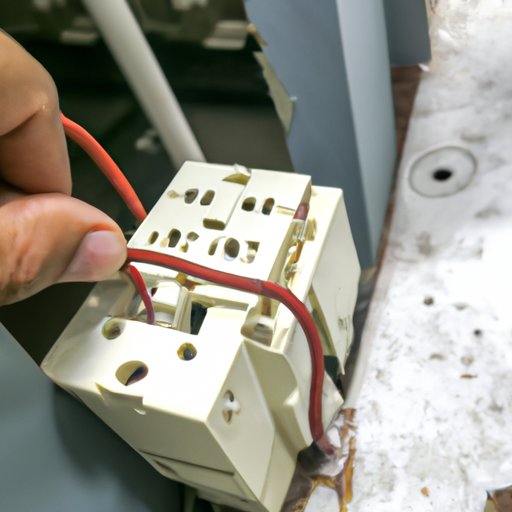Introduction
A tripped breaker is an issue that is commonly encountered in both residential and commercial settings. It occurs when too much electricity passes through the circuit, causing it to “trip” and shut off the power. This can be a minor inconvenience or a sign of a larger electrical problem.
What is a Tripped Breaker?
A tripped breaker is an electrical switch that shuts off the power to a circuit when an overload or short circuit occurs. If a breaker trips, it will either be in the “on” or “off” position. The breaker must be reset in order for the power to be restored to the circuit.
Why Do Breakers Trip?
Breakers trip for a variety of reasons, including overloaded circuits, short circuits, faulty wiring, and incorrect installation. When a breaker trips, it is a sign that something is wrong and should be addressed immediately.
Troubleshooting a Tripped Breaker
When a breaker trips, the first step is to check the circuit to determine the cause. If the breaker is tripping due to an overloaded circuit, it may be necessary to reduce the load on the circuit or move some of the appliances to another outlet. If the breaker is tripping due to a short circuit, it may be necessary to replace the wiring or call an electrician.

The Dangers of Tripped Breakers
If a breaker continues to trip, it can be a sign of an electrical problem that needs to be addressed. It is important to know when to call an electrician to diagnose and repair the issue. Common causes of tripped breakers include faulty wiring, overloaded circuits, and incorrect installation.
A Comprehensive Guide to Tripped Breakers
When dealing with tripped breakers, it is important to understand what to do and what not to do. Here are some tips for safely dealing with tripped breakers:
What to Do
- Check the circuit to identify the cause of the trip.
- Reduce the load on the circuit if necessary.
- Move appliances to a different outlet if possible.
- Call an electrician if necessary.
What Not to Do
- Do not attempt to repair the wiring yourself.
- Do not ignore a tripped breaker.
- Do not try to reset the breaker more than once.
- Do not use extension cords as a long-term solution.

Understanding and Preventing Tripped Breakers
In order to prevent tripped breakers, it is important to understand the causes and take steps to address them. Here are some tips for homeowners:
Tips for Homeowners
- Make sure all wiring and outlets are up to code.
- Do not overload circuits.
- Do not use extension cords as a long-term solution.
- Call an electrician if you notice any signs of an electrical problem.
Conclusion
Tripped breakers are a common issue that can occur in residential and commercial buildings. It is important to understand the causes of tripped breakers and take steps to address them. By following these tips, homeowners can help prevent tripped breakers and ensure their safety.
(Note: Is this article not meeting your expectations? Do you have knowledge or insights to share? Unlock new opportunities and expand your reach by joining our authors team. Click Registration to join us and share your expertise with our readers.)
